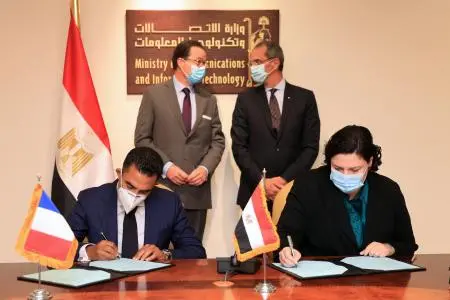PHOTO
The Ministry of Communications and Information Technology (MCIT) in Egypt has signed a MoU with Thales, a global leader in high technology solutions to further develop Artificial Intelligence applications in the country.
The MCIT aims to fortify the AI industry in Egypt and develop local skills, technology, infrastructure and governance mechanisms to ensure its sustainability and competitiveness through its National AI Strategy. Leveraging Thales’ vision to develop sovereign capabilities through local innovation, education and industry, common projects will be identified to strengthen Egypt's role as a regional leader and active global player in AI. Both seek to implement applications in fields such as ground transportation, e-government, mobility and smart infrastructure.
In a bid to accelerate innovation, the two entities will explore the capacity to build solutions across these industries, as well as the impact of AI on government, jobs, education, and the digital divide. Joint research will be conducted on AI ethics, explainability, and frugal learning in order to support the alignment on both countries’ stances on AI-related topics. This will be supported by general awareness campaigns and programs to educate the public on the opportunities and risks posed by AI, data privacy and separate myths from fact.
Thales and MCIT will also work closely with start-ups and organize hackathons to advance the professional development of local talents and enhance local capability.
AI is one of the key four technology pillars of Thales. Thales aims to drive and support the development of a certifiable, sustainable, explainable trusted AI. Thales TrUE AI, an approach introduced by the group in 2019, seeks to put the human back in control of high technology. It stands for Transparent AI, where users can see the data used to arrive at a conclusion, Understandable AI, that can explain and justify the results and finally an Ethical AI, that follows objective standards protocols, laws, and human rights.
“Egypt is keen on adopting and developing emerging technologies. This collaboration, which leverages AI for the benefit of citizens, accelerates our efforts of building a digital Egypt. The alliance also reflects the strategic partnership between Egypt and France in AI, as this marks the sixth consecutive MoU signed with our French partners in the past 18 months, and we look forward to more,” Dr. Amr Talaat, Minister of Communications and Information Technology said.
“The partnership with Thales is in line with the four pillars of the National AI Strategy, the first of which is capacity building, as we will collaborate in building the AI capabilities for the different segments of society. Additionally, we will also work on two more pillars, AI for Government (AI4G) and AI for Development (AI4D). These are achieved through developing AI-powered applications in different fields, as well as working to establish a common stance for Egypt and France for AI-related topics through conducting joint research on AI ethics,” he added.
“This MOU with the Ministry of Communications and Information Technology is an important milestone for Thales. The collaboration puts AI at the forefront of our joint projects, with an aim to provide smart and safe solutions and services for the smart cities of the future. The coming stage will focus on innovative solutions in fields such as ground transportation and e-government. Thales is committed to providing the best technologies and procedures in our joint projects.” Sherif Barakat CEO of Thales in Egypt.
About Thales
Thales (Euronext Paris: HO) is a global high technology leader investing in digital and “deep tech” innovations –connectivity, big data, artificial intelligence, cybersecurity and quantum technology – to build a future we can all trust, which is vital to the development of our societies. The company provides solutions, services and products that help its customers –businesses, organisations and states – in the defence, aeronautics, space, transportation and digital identity and security markets to fulfil their critical missions, by placing humans at the heart of the decision-making process.
Thales has 81,000 employees in 68 countries. In 2020 the Group generated sales of €17 billion.
About The Egyptian Ministry of Communications and Information Technology
The Egyptian Ministry of Communications and Information Technology is the government body responsible for information and communications technology issues in the Arab Republic of Egypt. Established in 1999, MCIT is responsible for the planning, implementation and operation of government ICT plans and strategies.
Press contact
Thales, Media Relations
Middle East
tarek.solimane@thalesgroup.com
© Press Release 2021
Disclaimer: The contents of this press release was provided from an external third party provider. This website is not responsible for, and does not control, such external content. This content is provided on an “as is” and “as available” basis and has not been edited in any way. Neither this website nor our affiliates guarantee the accuracy of or endorse the views or opinions expressed in this press release.
The press release is provided for informational purposes only. The content does not provide tax, legal or investment advice or opinion regarding the suitability, value or profitability of any particular security, portfolio or investment strategy. Neither this website nor our affiliates shall be liable for any errors or inaccuracies in the content, or for any actions taken by you in reliance thereon. You expressly agree that your use of the information within this article is at your sole risk.
To the fullest extent permitted by applicable law, this website, its parent company, its subsidiaries, its affiliates and the respective shareholders, directors, officers, employees, agents, advertisers, content providers and licensors will not be liable (jointly or severally) to you for any direct, indirect, consequential, special, incidental, punitive or exemplary damages, including without limitation, lost profits, lost savings and lost revenues, whether in negligence, tort, contract or any other theory of liability, even if the parties have been advised of the possibility or could have foreseen any such damages.




















